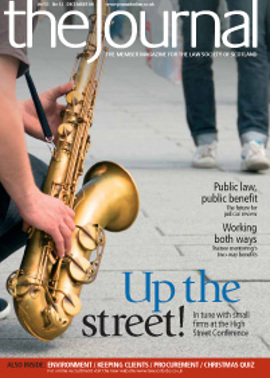The year that crunched

As winter approaches, perhaps you will have subjected yourself to a precautionary flu jab, or you may be working hard towards achieving that “five a day” fruit and veg target. Preventative healthcare increasingly pervades our daily lives and is constantly responding to newly identified health risks.
Minimising the risks to the wellbeing of your practice should be no different. This shouldn’t be a case of putting in place a set of measures on a once and for all basis and then forgetting about them and the risks they are designed to address. As the business environment changes, the risk environment also changes, and we all need to review the adequacy of existing procedures and to identify and address any new emerging risks.
So, how did the risk landscape change for solicitors during 2008? The commencement of the Scottish Legal Complaints Commission with effect from 1 October was one of the more significant landmarks; however it is too
to be certain what its impact on the profession will be. The decision at the Society’s AGM in May to permit alternative business structures generated much discussion about the comparative risks of different business models, but again, the impact on the risk profile of the profession remains to be seen.
In contrast, the adverse turn in the economy and the onset of the credit crunch have already created a changed risk environment and introduced new or heightened risks for the profession. The impact goes beyond the amount of work coming through the door and the impact on fee incomes: it affects the risk profile of the profession in a number of ways.
Client funds
The banking crisis, for instance, created an extraordinary situation where the possibility of a bank collapsing appeared for a time to expose solicitors to the risk of liability for the loss of clients’ funds through no fault at all on the part of the solicitors.
The Law Society of Scotland published a guidance note last month which concluded that solicitors do not have an absolute duty to account to clients for client funds which have been deposited in accordance with the Society’s Accounts Rules, unless the solicitor has actual or constructive knowledge of a material risk of failure of a particular bank.
The Society advises members to: reference the identity of banks used for depositing client funds within terms of engagement;
inform clients that if they wish funds to be deposited elsewhere, they require to instruct the solicitor.
One of the tangible outcomes of the concern caused by the banking crisis is an increase in the actual and planned number of incorporated practices and limited liability partnerships.
Dishonesty/fraud
In adverse economic conditions, when people are under greater financial pressures, insurers expect to see an increase in the incidence of fraud and dishonesty. The experience of claims arising out of theft of clients’ funds and firms’ own money has been relatively good over the last year or two; however it would be idealistic to believe that law firms are immune from the heightened fraud risk currently facing us both as individuals and as businesses.
Claims emerging in the course of the last month or two have revealed a number of instances of what appears to be organised mortgage fraud on the part of solicitors’ clients. There are instances of identity fraud where substantial loans have been obtained on security of property belonging to other people. The fraudsters have evidently misled both lenders and solicitors that they are the proprietors of the properties concerned.
The motivation for fraud may have increased, but the heightened risk needn’t mean heightened exposure to losses and claims, if the opportunities for fraudsters are minimised. To misappropriate the London Transport warning – “mind the gap”. Gaps in procedures and monitoring create avoidable opportunities for fraud.
Documentation errors
Quite apart from the heightened fraud risk, past experience suggests that recessionary conditions lead to increased allegations of errors and omissions on the part of solicitors and other professionals.
Parties keen to get out of business and other commitments are prompted to scrutinise the contracts they have entered into and seek to take advantage of loopholes, and solicitors may be criticised for drafting errors, omissions and ambiguities. Liquidators of failed businesses may seek to place the blame for failure with professional advisers.
Falling house prices and a growing number of repossessions will cause lenders to look very closely at information and advice provided to them at the time of the mortgage advance. The slightest error or omission on the part of a solicitor may result in a claim for losses suffered by the lender as result of the borrower’s default.
Seen from a PII insurer’s perspective, boom times preceding a recession create the conditions where there is a heightened risk of errors and omissions as a result of heavy workloads, time pressures and the demands of clients. In a recession, with business failures, borrower default and minute scrutiny of documentation, alleged deficiencies may be founded on as the basis for claims.
Preventing recession-generated claims
The mistakes that may form the basis of future lenders’ or liquidators’ claims, for instance, have in many instances already been made, and are potential time bombs ticking away inside closed and archived files.
But that isn’t to say that it is futile taking action to tighten up procedures now, and review files where corrective action could be taken which may pre-empt a future claim. Many claims arise from errors and omissions of a straightforward nature that a file review or other practice management process could pick up. For example, a review of concluded conveyancing transaction files (including, for instance, review of ledger balances and outstanding letters of obligation) should be able to identify where deeds have not been registered.
Client and transaction vetting
Whatever the impact of the credit crunch on practice workloads, all usual client and transaction vetting considerations continue to apply.
Don’t assume that everyone instructing you is in good faith and will behave with integrity. Do therefore exercise particular vigilance in vetting clients and transactions, and ensure (through the use of checklists or other practical controls) that Society advice on identifying mortgage fraud is followed. Beware of situations where the parties approaching you with new instructions may be intent on fraud. The location of property being purchased and/or the party giving the instructions perhaps ought to raise questions and reservations about the reason your firm has been selected.
Don’t assume that all your colleagues are conversant with and consistently complying with relevant controls. A review of files or other check may be appropriate to establish the level of awareness and compliance and to identify any training needs.
Diversification
For firms considering diversification to address reduced income from existing activities and services, it is one thing to venture into new practice areas after thorough assessment of the business and liability risks and putting in place appropriate risk controls – but dabbling in specialist areas without an adequate level of knowledge and controls is altogether different.
This is of particular concern at a time when risks for inexperienced practitioners may be heightened, for instance, by virtue of falling house prices and volatile stock markets – and with financially pressed clients tending to be especially demanding. PII insurers also worry that solicitors may be less diligent in vetting clients or addressing conflicts because of reluctance to turn business away.
Consider whether:
the firm has the resource to handle the volume of work satisfactorily;
colleagues reassigned to busier/new practice areas are receiving sufficient training and supervision;
effective controls are in place, and being operated.
Terms of engagement
Getting terms of engagement right is one of the principal ways of avoiding client claims. During more difficult economic times, when clients may be more inclined to dispute fees and challenge the service provided, it is particularly important to ensure that clients are absolutely clear about the scope of your engagement for the particular transaction and the terms on which services are being provided.
Merger due diligence
The credit crunch and the ongoing economic outlook may well prove to be a catalyst for mergers between law firms. Unless thorough due diligence is undertaken, there is a risk that one outcome of a merger will be the acquisition of not just the knowledge, experience and client following of the merger partner, but unwanted baggage in the form of recession-generated claims or complaints arising out of their track record of fee generation.
If you wish to be seen as an attractive merger/acquisition prospect, you will want to be in a position to present a favourable risk profile to interested parties. That means not just having a satisfactory claims record, but also being in a position to present convincing evidence of risk awareness and risk controls. These demonstrate that your satisfactory record is a matter of good management, not just good luck, and that there is no cause to anticipate recession-generated or other claims emerging in future out of the history of your practice.
December and January are often quieter times for many firms, and the current economic climate may also be reducing workloads for some. If so, this may create an opportunity to review procedures and progress management projects, including risk management initiatives put on hold during busier times.
The credit crunch means challenging times for clients and also for some solicitors. Make sure that risk management isn’t your firm’s crunch point.
In this issue
- Sale and purchase agreements – how to avoid the unexpected
- 2008: a year of change; 2009: a year for progress
- Law: it's the business
- Business makeover
- Training plus
- Registers update
- Public service
- One of a kind
- Brussels sprouts more eco-law
- Test yourself
- Trainees try again
- Terms of Business Guidance Note (November 2008)
- Guideline: Scanning and Archiving Documents (November 2008)
- Client, or customer?
- The changing faces of fraud
- Business advice roundup
- The year that crunched
- The anatomy of law firm failures
- Chapter and verse
- The power of agreement
- Under a cloud
- Scottish Solicitors' Discipline Tribunal
- ECJ in the fast lane
- Website review
- Book reviews
- Tender trouble
- Opportunity beckons, Smart tells symposium
- Public money or bust?






